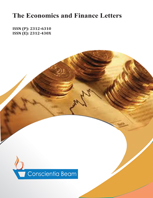Does External Borrowing Affect Economic Growth? A Revisit of the Age-Long Debate for Nigeria
DOI:
https://doi.org/10.18488/journal.29.2019.62.210.221Abstract
Given the recent phenomenon of government at all levels in Nigeria resorting to external loans to finance their annual budget deficits, the study then examined the implications of the external borrowing on the economic growth in Nigeria, using an Autoregressive Distributed Lag co-integration (ARDL) approach. Times series data spanning from 1987 to 2018 were collected from Central Bank of Nigeria and Debt Management Office. Corroborating some existing empirical evidence, the study finds a significant and positive effect of external debt stock on the economic growth in Nigeria, which is represented by gross domestic product growth rate (GDPRATE), and debt servicing impacts negatively on the economic growth both at the short run and the long run. The value of ECM-1 is -0.32281 indicating that the speed of adjustment from the short-run to the long run takes 32.28% and this is significant at 1%. The governments should channel these external loans in the value added sectors of the economy in order to boost employment, output, sustainable and collective growth of the economy. It therefore advises various organs of the government in charge of fiscal policy and policy implementation to beam their searchlights and oversights on the proper utilization of these loans to avoid diversion, misappropriation and non-implementation of vital projects.

